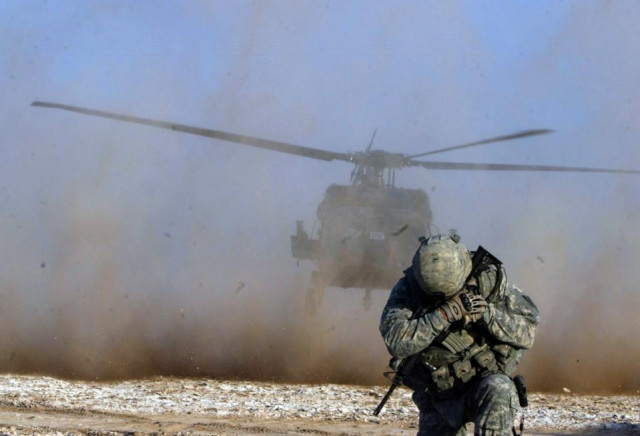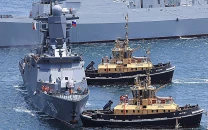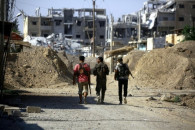US moves pilot rescue aircraft to Iraq: official
Defense official says some assets have been moved to northern Iraq

A soldier protects his face from helicopter dust during a mission by US forces in an area some 100 kilometres south of Kirkuk, Iraq, on December 24, 2010 PHOTO: AFP
"We are repositioning some assets into northern Iraq," a US defense official told AFP.
The move comes after US' coalition partner United Arab Emirates had requested American forces to position rescue aircraft closer to operational zones improve recovery chances for pilots downed over hostile territory such as the Jordanian pilot.
The UAE had pulled out of the flights seeing how the Jordanian pilot fell into IS hands in December.
Fearing for the safety of its air crews, the UAE raised concerns to Washington about its search-and-rescue resources in the region, officials said. UAE representatives proposed that American forces deploy their V-22 Osprey tilt-rotor aircraft to northern Iraq to be closer to any planes that go down, instead of in Kuwait.
The UAE has indicated that the suspension of its participation in the air campaign would continue until the Osprey aircraft were moved to northern Iraq, according to the Times.
The Ospreys are considered useful for rescue missions as they can take off like helicopters but fly with the speed of a plane.
US defense official have maintained that American pilots face the same risks as coalition pilots from the UAE or elsewhere.
"When American pilots fly over enemy territory, they know there are risks involved, but they also know they are backed by an unswerving commitment to recover them if they go down," the defense official said.
"There is no risk coalition airmen are taking that American airmen don't share. We do not discuss specifics on the locations of personnel recovery forces or the procedures they follow," the official added.
As for stationing aircraft in northern Iraq instead of Kuwait, the official said: "There are considerations other than flying distance associated with where we bed down aircraft, including the personnel and logistics needed to sustain operations."
"We continue to evaluate our basing arrangements and will make adjustments as needed."





1724148693-0/BeFunky-collage]_____-(24)1724148693-0-208x130.webp)













COMMENTS
Comments are moderated and generally will be posted if they are on-topic and not abusive.
For more information, please see our Comments FAQ